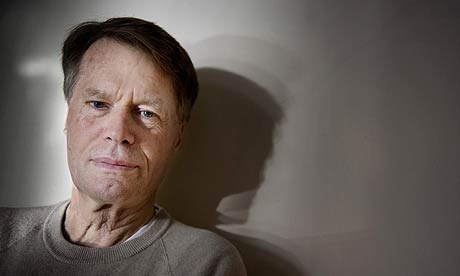
'Why not?' ... Jean-Marie Gustave Le Clézio. Photograph: AP
The Swedish Academy announced this lunchtime that French novelist Jean-Marie Gustave Le Clézio has won the Nobel prize for literature. Announcing the prize, Horace Engdahl, the permanent secretary of the Nobel judges, saluted him as an "author of new departures, poetic adventure and sensual ecstasy, explorer of a humanity beyond and below the reigning civilisation".
Le Clézio is the first French writer to take the 10m Swedish Krona (£815,000) prize since the French-Chinese author Gao Xingjian in 2000, although he was reluctant to identify himself strictly as a Frenchman. "I started in France, but my father was a British citizen, born in Mauritius. So I see myself as a mix, like many people currently in Europe."
"I am very touched and very emotional, it is a great honour for me," he said, adding that he had been busy writing when the call came through. "(I felt) some kind of incredulity, and then some kind of awe, and then some kind of joy and mirth," he told reporters at a press conference in Paris on Thursday afternoon. Asked if he deserved the prize, he replied "Why not?"
Born in 1940, Le Clézio first found fame aged 23 with his debut novel Le Procès-Verbal, which was awarded the Prix Renaudot for its depiction of a young man who ends up in a mental hospital. Compared to Sartre's Nausea and Camus's The Outsider, the book introduced one of Le Clézio's major preoccupations, that of the flight from the norm to extreme states of mind. It is still regarded as one of his best pieces of writing.
His real breakthrough as a novelist came with 1980's Désert, whose tale of a lost culture in the North African desert and a Europe seen through the eyes of immigrants won him a French Academy prize.

No comments:
Post a Comment